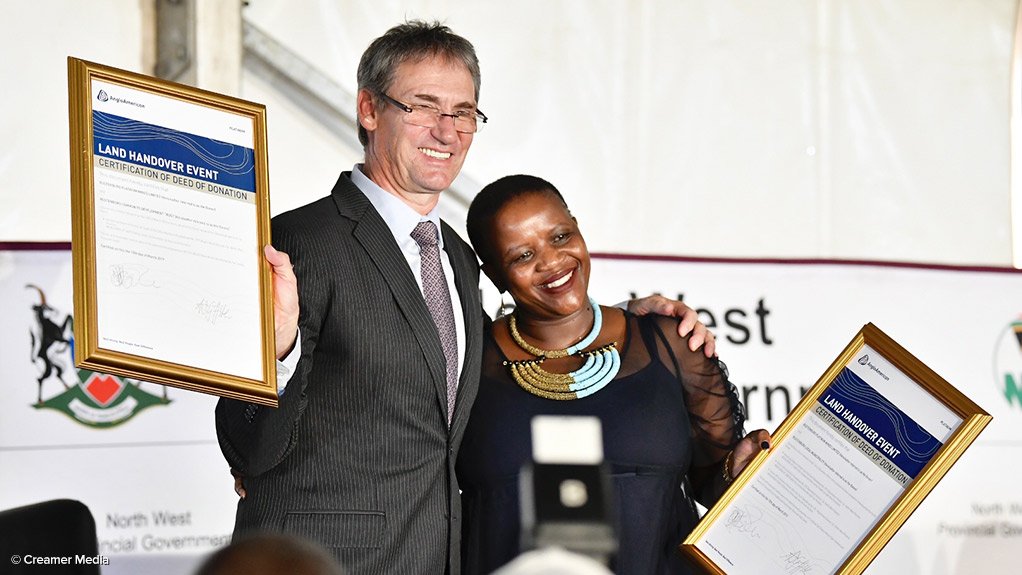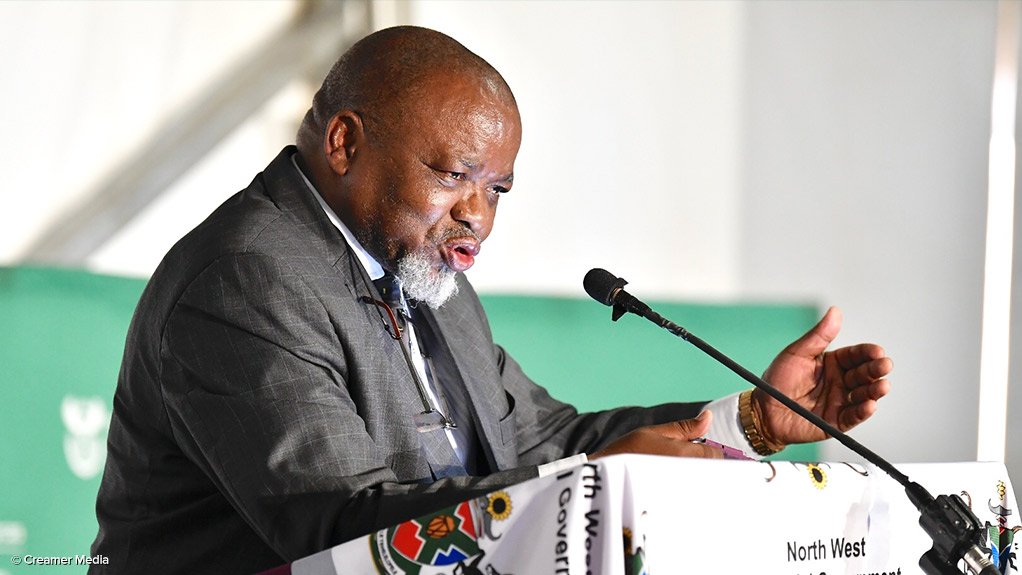JOHANNESBURG (miningweekly.com) – Anglo American Platinum (Amplats) on Friday handed over 270 ha of land, worth about R26-million, to the Rustenburg local municipality and the Rustenburg Alchemy Development Trust to support sustainable land reform and transformation.
Parent company Anglo American said the donation, which followed on Amplats’ 2014 donation of 204 ha of land, valued at about R31-million, further demonstrated Amplats and the group’s continued commitment to South Africa and the country’s ongoing transformation journey.
It further noted that expropriation without compensation need only be a last resort “if we all do our part to support land reform”.
Of the 270 ha, the municipality will take ownership of 242 ha for housing and resettlement projects, while the trust would receive the remaining 27 ha, on which it plans to build a care centre to house 155 people, including the elderly, orphans and child-headed families.
Rustenburg executive mayor Mpho Khunou stated that the transfer of the land was extremely important to the community, commenting that it assisted in lifting some of the uncertainty felt by communities around their future, as the donation enables the municipality and trust to address the housing backlog, as well as support economic sustainability of its constituents.
He expressed his gratitude, and reiterated that the donation demonstrated Amplats and Anglo American’s commitment to Rustenburg.
Amplats CEO Chris Griffith opened his speech by quoting former President Nelson Mandela, “each time one of us touches the soil of this land, we feel a sense of renewal.” Griffith noted that he felt a sense of renewal, joy and and exhilaration, “as we touch the soil of this land to make a positive difference to the people of Rustenburg”.
He reminded attendees of Amplats’ investment in the bulk market infrastructure of the area, citing the R140-million invested in a wastewater treatment plant and tarred roads, which enabled the North West Department of Human Settlements to build 4 000 housing units on serviced land.
Human Settlements Minister Nomaindiya Mfeketo commented that the donation would shape the economic recovery of the mine-affected communities, and noted that the right to suitable housing is enshrined in the Constitution.
She noted that the reality was that rural and impoverished communities were still hindered by the effects of Apartheid spatial planning and a lack of infrastructure meant that society as a whole had failed to commit to the ideals of inclusive growth.
Mfeketo stated that government was trying to deal with these issues in a collaborative manner. The idea is to enable better livelihoods by reusing mining land for housing and agricultural projects. The inter-Ministerial committee on mining towns, which is led by Mineral Resources Minister Gwede Mantashe, plans to target five mining districts and to meet with mining companies that are willing to partner in this regard.
Mantashe stressed that Amplats was not donating land, but rather “returning parcels of land to the people.”
He underscored the distinction stating that it demonstrated a voluntary return of land. “There was no need to threaten . . . It was given to you, you have given it back . . . there is no need for a land grab.”
Mantashe also made reference to the Mining Legacy compact signed by mining leadership at the Mining Indaba, noting that heads of industry had recognised that mining is inextricably linked to the ills of the country and, therefore, had a responsibility to be at the forefront of alleviating said ills.
The Minister added that his department was meeting with other platinum miners in the Rustenburg area, including Impala Platinum and Lonmin, to discuss the repatriation of more land. He also noted that mining houses could have a larger socioeconomic impact within the mining districts if they pooled their resources when deciding on corporate and social responsibility initiatives.
He asked that mining companies look into novel approaches for addressing inclusive societal growth.
Mantashe noted that the companies and communities needed to “look beyond mining”, which is inherently finite. He drew comparisons between the ghost town of Stillfontein and the city of Johannesburg, noting that the latter was developed to support industries outside of mining, while the former “was developed to be a dormitory”.
He added that, as government, “we don’t make promises . . . we commit ourselves.” He added that while It might take longer to realise the entirety of those commitments, they would be realised. He thanked Amplats for speeding up the realisation of government’s commitment to housing and land reform.
Griffith concluded his speech by saying that, given Anglo American’s 102-year history in South Africa, it has recognised that government will not achieve its developmental goals alone, and this transformation and reform programme demonstrated Anglo American’s commitment to building a country where all South Africans can achieve their potential.
EMAIL THIS ARTICLE SAVE THIS ARTICLE ARTICLE ENQUIRY
To subscribe email subscriptions@creamermedia.co.za or click here
To advertise email advertising@creamermedia.co.za or click here













